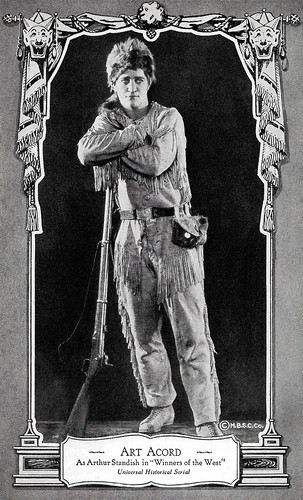
American postcard by Max B. Sheffer Card Co., Chicago (M.B.S.C.Co.). Photo: Universal. Art Acord as Arthur Standish in Winners of the West (Edward Laemmle, 1921). Caption: Universal Historical Serial.
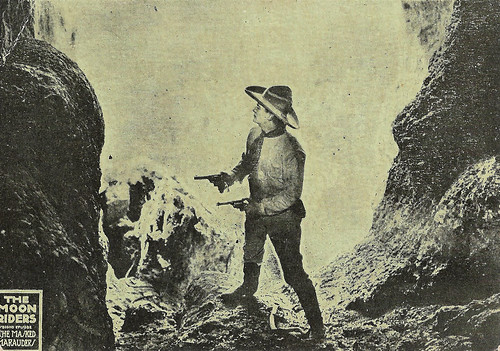
Spanish collectors card by Chocolate Pi, Barcelona, no. 5 of 54 cromo cards. Photo: Cinematografica Verdaguer, Barcelona. Art Acord in the lost American western serial The Moonriders (B. Reeves Eason, Theodore Wharton, 1920), distributed by Universal. It had 18 episodes and the Spanish release title was Los Jinetes de la Luna.
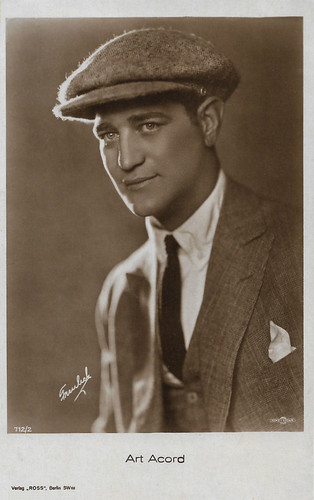
German postcard by Ross Verlag, no. 712/2, 1925-1926. Photo: Roman Freulich / Universal.
The Mormon cowboy
Art Acord was born as Arthemus Ward Acord in 1890 in Stillwater, Oklahoma, USA. Some sources believe it to be in Utah, with the family then moving to Stillwater. His parents, Valentine Louis Acord and Mary Amelia Acord (née Pedersen) were Utah pioneers and members of The Church of Jesus Christ of Latter-day Saints (the Mormon Church).
At the age of nine, he was a full-time wrangler on a ranch near town. As his riding skills increased, Acord began rodeo competitions around the country. In 1909 he was hired by the Dick Stanley-Bud Atkinson Wild West Show to perform the daring riding stunts for which he had become famous.
The handsome young man also started in the motion picture business in 1909 as a stuntman in Westerns. He was sometimes called the "Mormon cowboy". Five years later he began working for Mutual under the name Buck Parvin. He went on to become a noted actor in silent Westerns. In 1911, he worked with the Wild West show of William F. Cody. His horse was named Raven. he worked for a time for the Miller Brothers' travelling 101 Ranch Wild West Show. It was with the 101 that he became friends with Tom Mix, Yakima Canutt, 'Broncho Billy' Anderson, and Hoot Gibson.
In 1912, he won the Steer Bulldogging world championship. He won that same World Championship title again in 1916, defeating challenger and friend Hoot Gibson. His professional rodeo skills made him a believable and "real" cowboy on the screen. He had a small part in the early classic The Squaw Man (Oscar Apfel, Cecil B. DeMille, 1914), starring Dustin Farnum.
In 1915 his breakthrough film role came in the series Buck Parvin in the Movies (Charles E. van Loan, 1915). He enlisted in the U.S. Army in World War I and served overseas. He was awarded the Croix de Guerre by the French government for his bravery. After the war ended, he returned to films. He also joined the Dick Stanley Wild West Show in 1919.
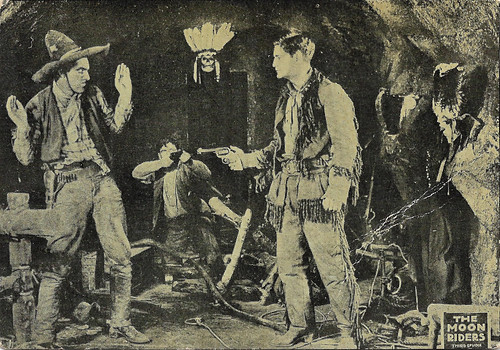
Spanish collectors card by Chocolate Pi, Barcelona, no. 7 of 54 cromo cards. Photo: Cinematografica Verdaguer, Barcelona. Art Acord (right) in the lost American western serial The Moonriders (B. Reeves Eason, Theodore Wharton, 1920), distributed by Universal. It had 18 episodes and the Spanish release title was Los Jinetes de la Luna.
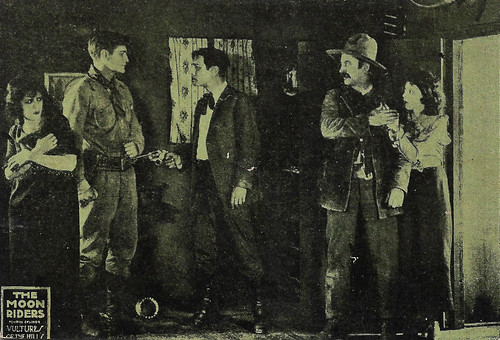
Spanish collectors card by Chocolate Pi, Barcelona, no. 11 of 54 cromo cards. Photo: Cinematografica Verdaguer, Barcelona. Beatrice Dominguez, Art Acord, George Field, Charles Newton, and Mildred Moore in The Moonriders (B. Reeves Eason, Theodore Wharton, 1920).
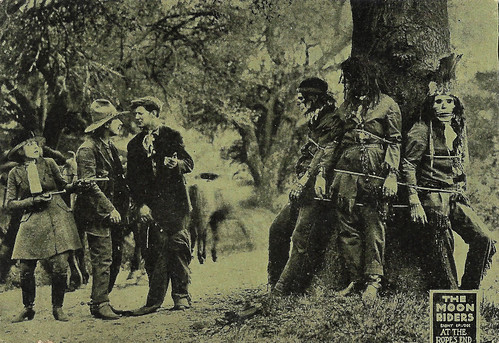
Spanish collectors card by Chocolate Pi, Barcelona, no. 24 of 54 cromo cards. Photo: Cinematografica Verdaguer, Barcelona. Mildred Moore, Charles Newton, and Art Acord in The Moonriders (B. Reeves Eason, Theodore Wharton, 1920).
A heavy drinking problem
During the 1920s, Art Acord became one of Universal's star cowboys. In total, he made over 100 films, most of which are now considered lost. Because of a heavy drinking problem and his inability to adapt to the advent of talkies, his film career fell apart. By the time of his last silent film, The White Outlaw (Robert J. Horner, 1929), he looked tired and worn.
His lifelong fight with alcoholism had taken its toll. He would sometimes disappear for days at a time, causing a shutdown in film production. The major studios eventually lost interest, leaving only the low-budget film companies to work with him.
Later, Acord worked in rodeo roadshows and as a miner in Mexico. He was married to Edythe Sterling, former actress Edna Nores, and actress Louise Lorraine. All three marriages ended in divorce.
He then relocated to Mexico where he worked in a rodeo. In 1931 Art Acord was found dead in his Chihuahua, Mexico hotel room. He died of cyanide poisoning. Although the Mexican police officially listed his death as a suicide, many of his friends over the years insisted that he had been murdered by a Mexican politician who had caught Acord having an affair with his wife.
Acord was interred at Forest Lawn Memorial Park Cemetery in Glendale, California. In 1960, he was awarded a Star on the Hollywood Walk of Fame. Although most of his films are lost, 20 have been discovered in private collections and archives.
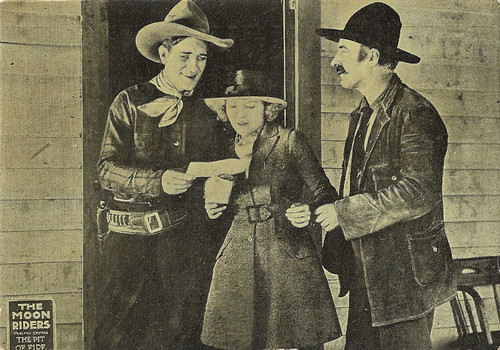
Spanish collectors card by Chocolate Pi, Barcelona, no. 37 of 54 cromo cards. Photo: Cinematografica Verdaguer, Barcelona. Art Acord, Mildred Moore, and Charles Newton in The Moonriders (B. Reeves Eason, Theodore Wharton, 1920).
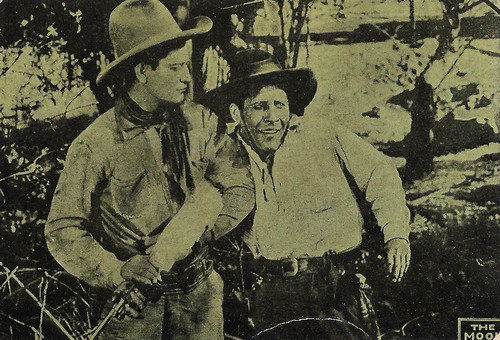
Spanish collectors card by Chocolate Pi, Barcelona, no. 44 of 54 cromo cards. Photo: Cinematografica Verdaguer, Barcelona. Art Acord (left) in The Moonriders (B. Reeves Eason, Theodore Wharton, 1920).
Sources: Sandra Brennan (AllMovie), Encyclopedia of Oklahoma History & Culture, Wikipedia, and IMDb.
No comments:
Post a Comment